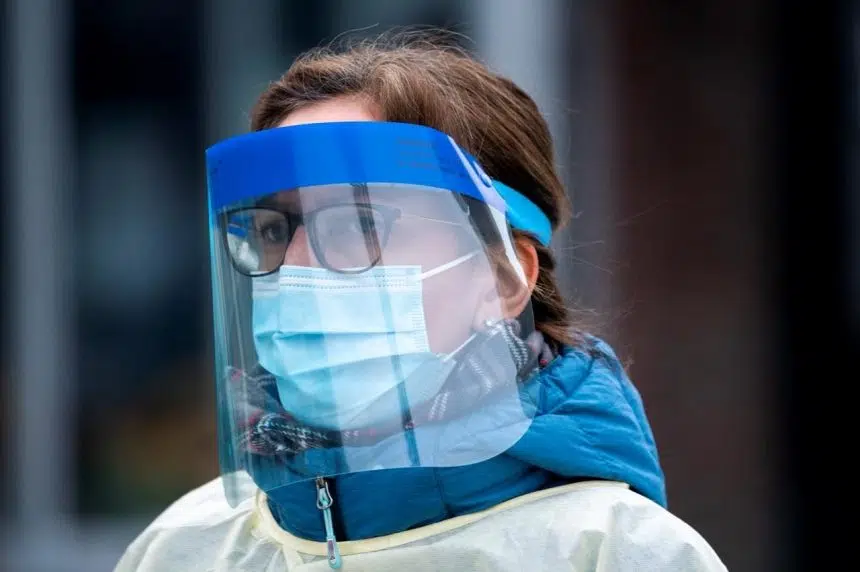Help is on the way for Saskatchewan’s beleaguered health-care workers — but it’s not as much as the province was after.
During a COVID-19 technical briefing Monday, Saskatchewan Public Safety Agency president Marlo Pritchard said six critical-care nurses provided by the federal government are to start working in Regina on Wednesday.
“We did ask for some other specialized supports for ICUs that of course were not available,” Pritchard said. “The six ICU nurses were a federal resource.
“We also have up to 20 Canadian Red Cross nurses — although not critical care — and those are still being worked on and planning is still in place. We don’t know exactly when they will arrive.”
Pritchard noted he learned during conversations at the federal level that the number of resources available to be moved between provinces in Canada “were not great.” The federal government promised to help, but there aren’t a lot of specialized health-care workers available to help in Saskatchewan’s ICUs.
After Premier Scott Moe told reporters in Saskatoon on Monday that 60 to 70 nurses will join the health-care system in the coming months, Scott Livingstone — the CEO of the Saskatchewan Health Authority — outlined where that group is coming from.
Some of the critical-care nurses currently are being trained by Sask Polytechnic and are to graduate in the coming months, while the SHA also is looking to add more than 30 trained ICU nurses on contract.
“Any help that we can get with highly skilled, trained critical-care nurses is welcome,” Livingstone said. “With respect to the six nurses that are being deployed from the federal government to Regina, they certainly will help relieve some of the stress on current staff.”
But Livingstone noted it takes more than five full-time employees on a nursing staff to keep one ICU bed open for 24 hours. As a result, the six new nurses won’t allow Saskatchewan to open any beds.
They also won’t give the province the ability to resume services that previously were put on hold due to a lack of ICU beds.
“There is no intent at this time, with the resources that are coming on board, to look at a broad-scale restart of any programs that have been slowed down,” Livingstone said. “In fact, our priorities would be some of the unintentional implications of having our ICUs as full as they are.
“In particular, there have a number of critical surgeries for both cardiovascular patients and neurosurgery (patients) postponed because of the lack of an available ICU bed that they would need post surgery.
“So our priority would be — and always would be — not just to care for our COVID patients using all the resources, including out-of-province ICU care, but at the same time try to build the capacity in the province to start restarting some of those procedures.”
There were 71 COVID patients in Saskatchewan ICUs on Monday, as well as 45 non-COVID patients.
The province already has transferred nine ICU patients to Ontario, with three more to be moved Monday and another four on Tuesday. Pritchard said between two and four people could be moved daily after that.
In addition to the nurses, Saskatchewan also has been given the use of a medical transport plane that has been specially outfitted to transfer ICU patients. The first flight from Saskatchewan is expected to take off Tuesday.
Patient transfers
Asked what criteria go into selecting patients for transfer, Livingstone said a critical-care team evaluates all ICU patients to determine which ones can be moved.
The problem is that COVID patients can deteriorate quickly.
“Patients we may be targeting for transport may not be healthy enough to do so and the team would actually evaluate that in real time and plan for those transfers as quickly as we can,” he said.
Monoclonal antibodies
The provincial government announced Monday it was making monoclonal antibodies available to some unvaccinated people to help them battle COVID.
The federal government is sending 1,200 doses to Saskatchewan, which already has received 476 doses. The cost is being covered by the federal government.
Dr. Saqib Shahab, Saskatchewan’s chief medical health officer, said the antibodies can be effective but they’re not a substitute for vaccinations.
“If you’re driving on an icy road — and let’s say with high COVID transmission, it’s an icy road — vaccines are like a seatbelt,” Shahab said. “If you do get in a crash, they reduce your risk of serious illness or death and they only work if you have them on.
“Then monoclonal (antibodies) are like an ambulance that may or may not arrive in time depending on where you are … Just because you may have an ambulance that could arrive in time doesn’t mean you shouldn’t put your seatbelt on.”







